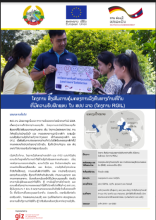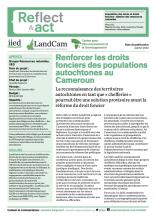Land Library
Bienvenue dans la bibliothèque du Land Portal. Explorez notre vaste collection de ressources en libre accès (plus de 74 000), comprenant des rapports, des articles scientifiques, des articles de recherche, des publications évaluées par des pairs, des documents juridiques, des vidéos et bien plus encore.
/ library resources
Showing items 2350 through 2358 of 74235.ສປປ ລາວ ມີແຜນຈະຫ ຼຸດພ ົ້ນອອກຈາກການເປັນປະເທດດ້ອຍພັດທະນາໃນປີ2024.ເພ ື່ອກະຕ ້ນການເຕີບໂຕທາງດ້ານເສດຖະກິດ, ລັດຖະບານລາວໄດ້ເລັົ່ງໃສ່ເສດຖະກິດ ສ ົ່ງອອກທີື່ອີງໃສ່ຊັບພະຍາກອນທໍາມະຊາດ, ເຊັົ່ນ: ໂຄງການບ ໍ່ແຮ່ຂະຫນາດໃຫຍ່, ການ ກ ໍ່ສ້າງເຂ ື່ອນໄຟຟ້າພະລັງນໍ້າ ແລະ ການຂະຫຍາຍການປູກພ ດກະສິກໍາ. ຈ ດສ ມຫ ັກ
Au Cameroun, l’augmentation des investissements à grande échelle, dans des secteurs tels que l’agro-industrie, l’exploitation minière et forestière, a entraîné de nombreux transferts de droits fonciers des communautés locales vers les acteurs commerciaux.
Agriculture is widely recognized as a solution to food insecurity and poverty, especially in rural areas. However, 75% of the world’s poor live in rural areas, and agriculture is the primary source of their livelihood.
Across South Asia, millions of small-scale farmers are confronted with a range of urgent challenges. These include poverty, malnutrition, environmental deterioration, and the growing impacts of climate change and unpredictability (Ericksen et al., 2011).
Background: Understanding how local communities perceive threats and management options of wild edible plants (WEPs) is essential in developing their conservation strategies and action plans.
The purpose of this Context Assessment is threefold: first, to characterize the environmental, social, economic, and political contexts of the Tunisian Agroecological Living Landscape (ALL); second, to understand the data and information currently available in the sub-region of this ALL; and thir
Over the past two decades, Vietnam’s GDP per capita has grown ninefold. Concurrently, its agricultural sector has transformed to a strong commercial orientation.
The 2023 year-end workshop with the national partners from the CGIAR Initiative SIMFS was held on 2 December in Hotel Sarina, Dhaka, Bangladesh. The meeting was presided over by Dr. Humnath Bhandari, IRRI Representative for Bangladesh.




